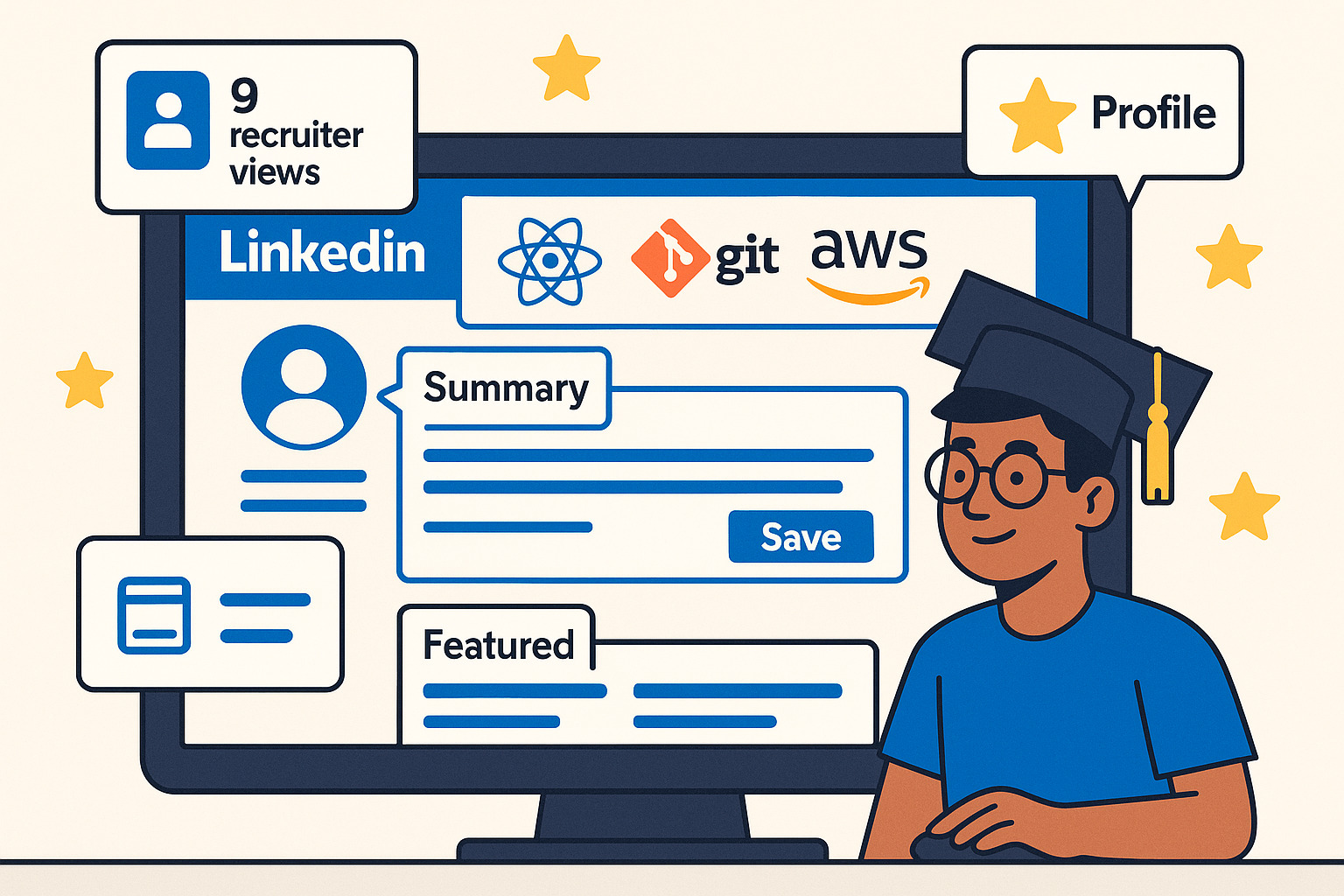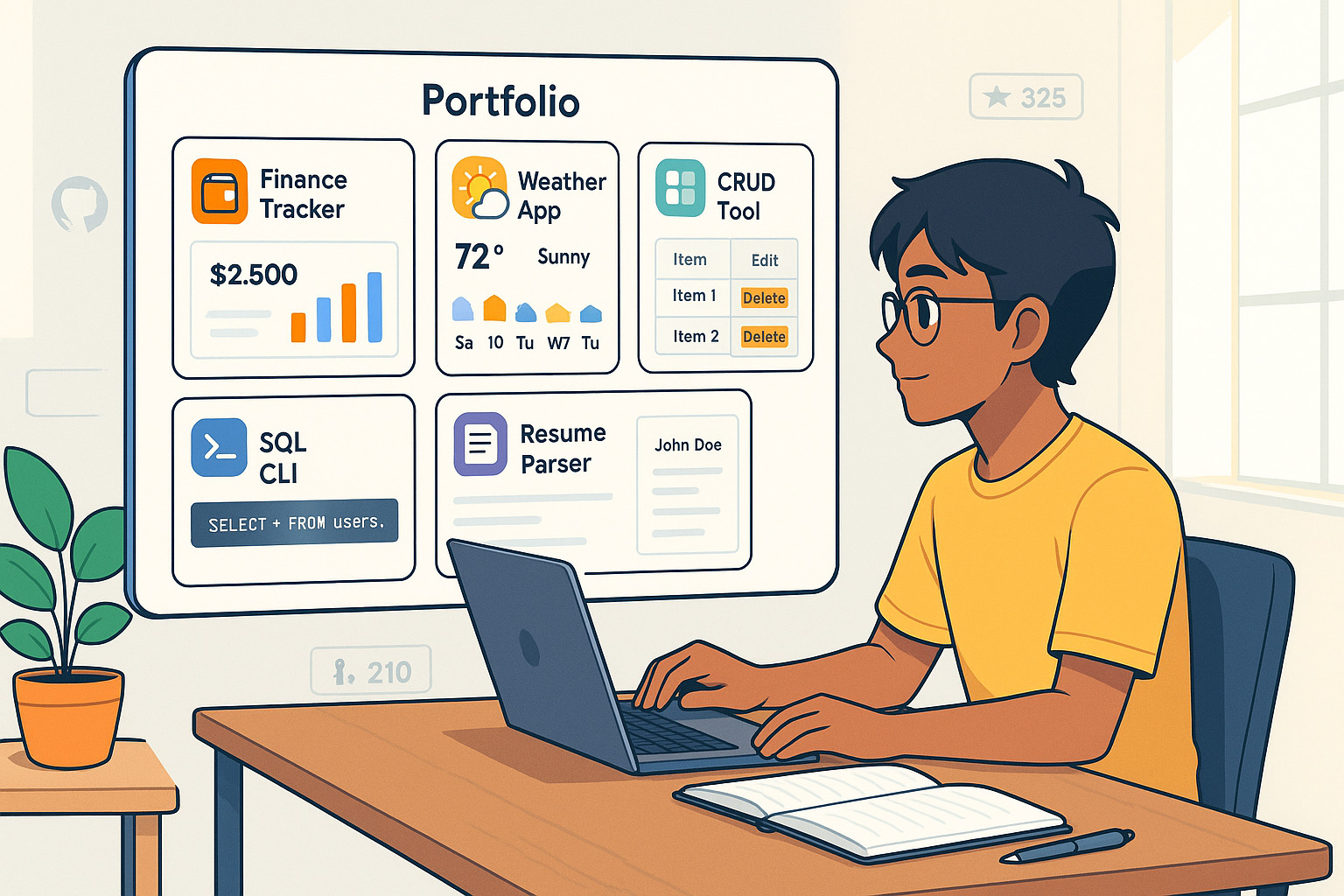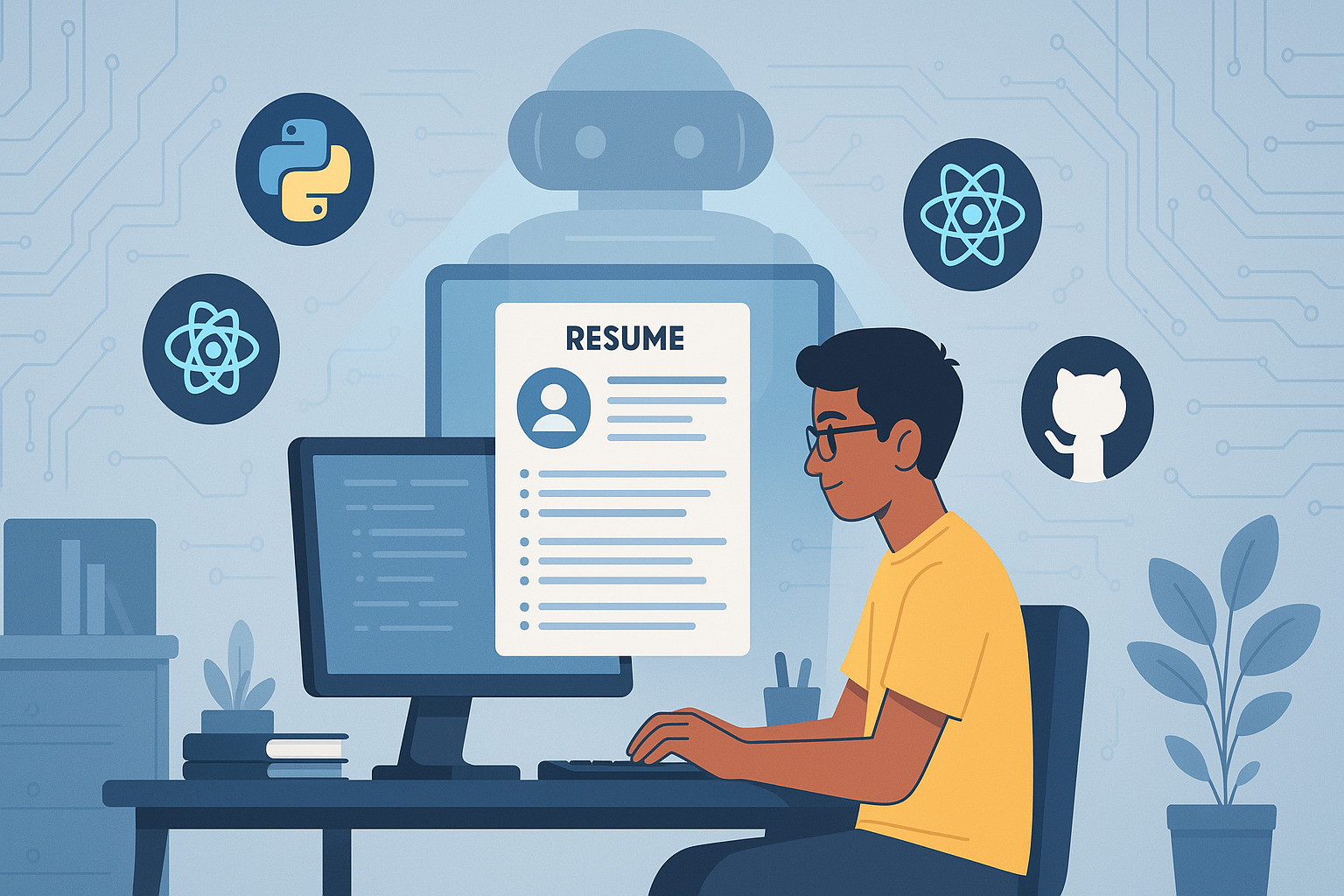Every year, lakhs of Indian engineering graduates step into the job market hoping to launch a career in tech. But for many, especially from Tier-2 and Tier-3 colleges, that dream feels distant.
The tech hiring landscape in India is unique, and so are the challenges freshers face. You're not just competing with your batchmates, but with an entire generation of peers who may have better exposure or early industry experience.
Even strong students find themselves unsure of where to start or how to stand out.
This guide is your roadmap: a focused, honest, and action-packed walkthrough to help you land your first tech job the right way.
Why Tech is Still a Great Career Bet in India (Even in 2025)
India's tech industry continues to grow despite automation and global economic swings. Roles in AI, cloud computing, software engineering, and cybersecurity are in high demand, with average fresher salaries ranging from ₹3–8 LPA.
Cities like Bangalore, Pune, and Hyderabad remain hotbeds for hiring, but even remote roles have opened up possibilities across Tier-2/3 cities. Startups are actively hiring for product-based tech roles, and the gig economy is growing, offering flexible options for new graduates.
Why does it matter? Your first job in tech might not be at a unicorn startup or FAANG company, but it can kick-start a high-growth, stable career path with plenty of learning opportunities.
Step 1: Choose Your Path – Which Tech Role is Right for You?
Before diving into job prep, it’s essential to choose a tech role that aligns with your interests and strengths. The tech industry is broad and each role demands a different skill set and mindset.
A focused fresher who builds toward a specific goal stands out far more than someone dabbling across domains.
Take the time to explore what each role involves day-to-day. Read job descriptions, talk to seniors, and review online content. Once you decide, channel all your learning and project work in that direction—this clarity is your best differentiator in a crowded fresher job market.
Popular entry-level roles include:
- Software Developer (Frontend, Backend, Full-Stack)
- QA Engineer (Manual or Automation)
- DevOps Engineer
- Data Analyst or BI Developer
- Cybersecurity Analyst
How to choose:
- Research job descriptions on LinkedIn or FirstJob
- Read blogs & watch role comparison videos to understand daily responsibilities
- Try out beginner projects in different domains to see what excites you
- Take a "Which Tech Role Fits Me?" quiz (coming soon on our blog!)
Choosing a path helps you build focused skills, stand out in applications, and prepare better for interviews.
Step 2: Build Job-Ready Skills
You don’t need a fancy computer science degree or a big-name college tag to break into tech. What you do need is proof that you can solve problems using technology.
Employers look for practical, demonstrable skills—like coding a web app, writing clean SQL queries, or contributing to GitHub projects. These show your readiness better than a certificate ever could.
Pick one language and stick with it. Master the basics of Git, DSA, and SQL. Build a few small projects that solve real-world problems. This hands-on ability is what truly prepares you for your first job and makes you stand out in a stack of resumes.
Core skills to start with:
- Programming: Learn one core language well — Python, JavaScript, Java, or C++
- Version Control: Git & GitHub for collaboration and portfolio showcasing
- Databases: SQL basics and optionally NoSQL (MongoDB)
- Web Development: HTML, CSS, JavaScript for frontend/back-end skills
- DSA (Data Structures & Algorithms): For interviews and coding tests
Where to learn?
- Free: YouTube, FreeCodeCamp, Khan Academy
- Paid (India-focused): NxtWave’s CCBP 4.0, Coding Ninjas, Udemy courses tailored for freshers
- Certifications (Optional but Helpful): Google IT Support, AWS Cloud Practitioner
Pro tip: Don't over-enrol. Learn a few tools well and showcase depth, not breadth. Real-world problem solving matters more than 20 certificates.
Step 3: Create a Strong Fresher Portfolio
Hiring managers want proof that you can build, not just that you can learn. Your college marks may get you eligibility, but it’s your portfolio that truly speaks for your capabilities.
A well-documented GitHub repo with clear ReadMe files, working project links, and thoughtful code will always have more impact than a certificate.
Focus on solving real problems like building a weather app, a task tracker, or a dashboard using public APIs. Show your thought process, problem-solving skills, and tech stack choices. Make sure your portfolio highlights not just what you built, but how and why you built it.
What should a strong fresher portfolio include?
- 2–3 solid projects: Real-world inspired apps, think Todo apps, budget trackers, blog platforms, or a simple dashboard
- Project hosting: Host live on Netlify, Vercel, or GitHub Pages. Link repos with detailed ReadMe files
- One team/internship project: Shows collaboration and professional readiness
- Documentation: Screenshots, features, tech stack used, and your role explained clearly
Bonus visibility tips:
- Write project retrospectives or tutorials on LinkedIn, Medium or Substack
- Link your GitHub in your resume and include a "Portfolio" section
- Use visuals, GIFs, and screenshots to make your GitHub ReadMes pop
Step 4: Write a Resume That Gets Shortlisted
Your resume is your elevator pitch, it should instantly convey who you are, what you know, and what you’ve done. As a fresher, your resume needs to highlight your technical skills, projects, and learning potential over work experience.
It’s not just about listing tools; it's about showing how you used them. Use action verbs, quantify project impact when possible, and ensure every section aligns with the job you're applying for.
Tailor your resume for each application, include GitHub and LinkedIn links, and avoid fluff. A sharp, role-focused resume gets you into the shortlist pile.
How to craft a fresher IT resume?
Focus on:
- Header: Name, email, GitHub, LinkedIn, personal site (if any)
- Skills: Keep role-relevant tech skills in bullet points
- Projects: Mention title, tools used, key features, and link to GitHub
- Education: College, degree, and notable academic achievements
- Certifications: Only if relevant and from credible sources
Tips for standing out:
- Use power verbs: "Built," "Developed," "Optimized," "Integrated"
- Quantify achievements: "Built a Django blog platform with 150+ monthly users"
- Use a clean, ATS-friendly format (no tables, fancy fonts)
Note: Make sure your resume is ATS-friendly. ATS (Applicant Tracking System) software scans resumes before a human sees them. Use standard section headers, avoid text inside tables or columns, and save your resume as a PDF to ensure proper parsing.
Step 5: Apply for Jobs Strategically
Sending out the same resume to hundreds of companies isn’t just ineffective, it can damage your credibility. Recruiters can instantly spot a generic application that lacks intent or alignment.
Instead, focus on 8–10 well-researched, relevant applications per week. Read each job description carefully and tweak your resume and cover message to highlight the exact skills they’re looking for.
If a posting mentions React, make sure that project is prominent on your resume. If it's a backend role, emphasize your API work. Tailoring shows effort—and that alone can lift you above 80% of applicants. Your goal is quality, not quantity.
Where should you apply first, and how to stand out?
Best places to apply:
- Indian job portals: FirstJob, Naukri, Freshersworld
- Global platforms: LinkedIn, AngelList, Wellfound
- Communities: r/IndiaJobs (Reddit), WhatsApp groups, Twitter job threads, Discord servers
Smart application strategies:
- Use a job application tracker (spreadsheet or Notion)
- Match your resume to the job description keywords
- Write short, custom cover emails/messages — show enthusiasm
- Leverage alumni networks: Search LinkedIn with filters like "[College Name] + [Company]"
Cold outreach sample message to Hiring Managers:
"Hi [Name], I saw you work at [Company]. I'm a recent BTech graduate and interested in [Role]. I’ve worked on [brief project]. Would love any tips or guidance."
Step 6: Prepare for Online Tests (Coding + Aptitude)
Online assessments have become the primary gatekeeper for most entry-level tech jobs in India. These tests are often the first step after you hit 'Apply,' and companies use them to quickly screen large applicant pools before moving to interviews.
Many freshers underestimate these assessments or rely solely on college-level preparation– It won’t.
Understanding the test format, building a preparation routine, and practicing consistently is essential. You will have to treat these assessments like mini-entrance exams.
Which test rounds should I expect, and how to prepare?
Common rounds for freshers:
- Coding DSA rounds: Arrays, strings, recursion, sorting, etc.
- Aptitude rounds: Logical reasoning, quants, verbal ability
- Behavioral MCQs: Workplace situational questions, ethics, etc.
Best platforms to prepare:
- HackerRank & GeeksforGeeks
- Practice company-specific mock tests (TCS NQT, Wipro Elite, Infosys tests)
- Simulate test environments with 60–90 minute mock assessments
Study plan:
- Start with basic DSA: Arrays, Strings, Stacks, Queues
- Progress to Trees, Graphs, Recursion, DP
- Practice 5 questions/day consistently
Track your improvement:
- Maintain a "Mistake Book"
- Log test results, attempt patterns, and retry incorrect problems
Step 7: Ace the Interview
Cracking interviews as a fresher is about preparation, not pedigree. You need clarity, confidence, and communication.
Start with a deep understanding of your fundamentals: DSA, OOPs, and SQL basics. Then, learn to articulate your thought process clearly when solving problems.
Practice explaining your projects, walking through your code, and answering behavioral questions using the STAR method. Mock interviews can make a huge difference, simulate real scenarios with peers or mentors, get feedback, and iterate.
Many candidates fail not due to lack of knowledge, but due to nervousness or unclear communication. Practice until you sound calm, concise, and confident.
How can freshers ace tech and HR rounds?
Common technical questions:
- Explain DSA concepts: What’s a stack? How do you reverse a string?
- SQL: Write a query to find the second highest salary
- OOPs: What is inheritance? Difference between abstraction and encapsulation
- Explain your projects: What problem does it solve? What was your role?
Common HR questions:
- Tell me about yourself (script this answer — it’s your pitch!)
- Why should we hire you?
- Talk about a time you faced a challenge — use STAR method
Mock Interviews:
- Practice with friends or use AI mock interview platforms like NxtMock
- Record yourself — review body language and clarity
BONUS: After the Offer – Thriving in Your First 90 Days
Your offer is just the starting line, not the finish. What you do in the first 90 days can shape how your team, manager, and organisation perceive you long-term. This is the time to listen actively, absorb your company’s workflows, and deliver small wins that show initiative.
Don’t wait to be told—volunteer for minor tasks, ask smart questions, and learn the team's tools and culture. Create a daily learning log to track new terms, tech, and processes. Schedule 1-on-1s with seniors or buddies if available. The first impression you leave as a fresher can open doors to mentorship, responsibility, and trust, which is exactly what you need to accelerate your growth.
What should you focus on once you join?
- Understand the systems: Set up your dev environment, explore codebases
- Meet the people: Introduce yourself to your team, shadow seniors
- Learn the tools: Jira, Git, Slack, Notion, Zoom — whatever your team uses
- Contribute early: Fix small bugs, write documentation, update tests
- Ask questions: Clarify goals, task context, and company norms
Growth Tips:
- Reflect weekly: What did I learn? What confused me?
- Maintain a learning log on Notion
- Update your resume and LinkedIn with new experiences
FAQs: What Freshers Want to Know
Can I get a tech job in India without experience or a CS degree?
Yes! Focus on learning real-world skills like coding, DSA, and Git and building mini-projects or prototypes. Companies care more about what you can build than what you studied.
What is the average fresher's salary for tech jobs in India?
Typically ₹3–8 LPA for most roles. Niche roles (AI/ML, cybersecurity) can offer ₹10 LPA+. Startups may offer Employee Stock Options (ESOPs) or perks, while MNCs often provide better stability and training.
Which job portals work best for tech freshers?
Start with FirstJob, Naukri, LinkedIn, and Freshersworld. Don’t ignore Discord groups, WhatsApp channels, and Twitter threads.
How many coding problems should I solve for interviews?
Aim for 200–300 DSA problems across basic and intermediate levels before interviews.
How can I improve if I keep getting rejected?
Track patterns in rejections: Is it at the test, resume, or interview level? Seek feedback, iterate on weaknesses, and build better projects.
Final Thought: You Got This
Getting your first tech job as a fresher in India isn't easy, but it's absolutely possible. Here’s the playbook:
- Clarify your target role
- Learn in-demand skills through structured and project-based paths
- Build a portfolio that speaks louder than your marks
- Make resumes and LinkedIn profiles shine with projects and keywords
- Apply smartly using portals and networks, not mass blasts
- Prepare methodically for coding and HR rounds
- Once onboard, own early wins and plan your first two years
You need one offer. And that offer is out there waiting for you.
Believe in yourself: your path might be less trodden, but it's no less effective. Put in the work, and in a year, you’ll be mentoring others.







